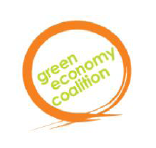The analysis examines 18 submissions of governments, with a focus on: government positioning on the green economy; framing of the green economy; key priorities and practical proposals for the UN Conference on Sustainable Development (UNCSD, or Rio+20) on the green economy; additional highlights from the submissions; and opportunities, barriers and concerns of developing countries.
 January 2012: The Green Economy Coalition (GEC) has published an analysis of 18 submissions by governments to the Compilation Document for the UN Conference on Sustainable Development (UNCSD, or Rio+20). The report, titled “Green Economy: ‘Everyone’s talking about it,’” aims to enhance understanding of governments’ responses to the concept of a green economy.
January 2012: The Green Economy Coalition (GEC) has published an analysis of 18 submissions by governments to the Compilation Document for the UN Conference on Sustainable Development (UNCSD, or Rio+20). The report, titled “Green Economy: ‘Everyone’s talking about it,’” aims to enhance understanding of governments’ responses to the concept of a green economy.
Drawing on the submissions from 18 government submissions – from Brazil, Canada, Chile, China, the EU, Ghana, India, Indonesia, Japan, Kenya, New Zealand, Norway, Pakistan, Philippines, the Russian Federation, South Africa, Switzerland, and the US – the analysis attempts to assess the extent to which the concept of green economy is gaining political traction at the global and national level.
The analysis focuses on five questions: how are governments positioning themselves on green economy; how is green economy being framed and understood; what are the key priorities and practical proposals for the UNCSD on green economy; what are additional highlights of the UNCSD submissions; and what are the emerging concerns and opportunities associated with a green economy for developing countries?
On government positioning on the green economy, the analysis concludes that a significant majority of governments, regardless of their development levels, are actively engaging with the concept of a green economy, and that both developed and developing countries are already beginning to identify potential opportunities for their own national priorities.
On the framing of the green economy, the report concludes that although the meaning and definition of green economy vary, for all governments, a green economy must achieve sustainable development and tackle poverty, and also address the issue of climatic and economic resilience.
In addition, the analysis notes some of the key priorities for Rio+20 identified in the submissions, including sustainable development goals (SDGs), new national indicators to measure societal and environmental health, job creation, phasing out harmful subsidies, and financial mechanisms. The analysis also identifies the top opportunities, barriers and concerns of developing countries. [Publication: Green Economy: Everyone’s Talking About It]